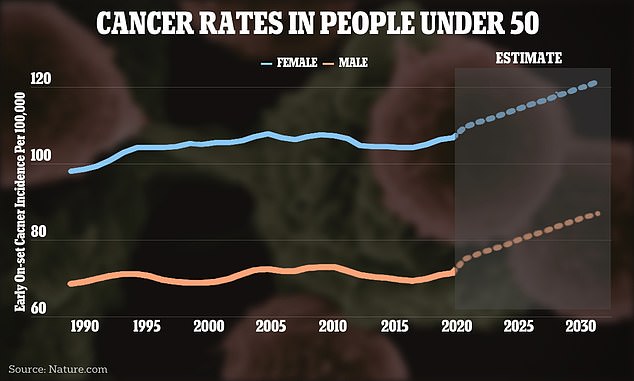A North Carolina doctor talks about the rise in cancer cases among young people and reveals that “every new patient” who comes to his clinic is under 45.
Duke University oncologist Dr. Nicholas DeVito says he and his colleagues have experienced a complete demographic shift in recent years, which Ultra-processed foods (UPF) are to blame.
Nearly 75 percent of the foods consumed in the United States are considered ultra-processed and are packed with harmful additives and ingredients.
And these products are subject to virtually no regulation despite numerous studies showing an association between a diet rich in UPF and more than 30 diseases, including cancers.
The graph above shows the change in early-onset cancer rates worldwide, divided by women (pink) and men (blue).
Dr. DeVito has called on officials across all industries and political parties to do more to protect Americans from these harmful products.
The doctor wrote for STAT News: ‘The desire to protect Americans from substances that cause cancer and other diseases must transcend party affiliation and political motivation to overcome industry lobbying efforts.
“This was possible with tobacco and it is also possible with food.”
He added: “This will undoubtedly require Americans to make different choices about what they eat to prioritize their health over corporate profits and sometimes even their own convenience.”
Preliminary studies have shown that UPFs (foods that have gone through several rounds of processing and had artificial ingredients added) can disrupt the gut microbiome (a collection of healthy bacteria), damage intestinal walls, and cause chronic inflammatory diseases, all of which can increase the risk of cancer.
Between 1990 and 2019, cancer cases in young people worldwide increased by 79 percent and deaths increased by 28 percent.
The United States has the sixth-highest rate of early-onset cancers (disease in people under age 50), with 87 cases per 100,000 people under age 50.
And studies project that diagnoses of early-onset cancers will increase by 31 percent and deaths will increase by 21 percent by 2030.
The cancers that are increasing the fastest are those of the throat and prostate. The early-onset cancers with the highest mortality rates are those of the breast, trachea, lung, stomach and colon.
But 40 percent of cancers in the U.S. are caused by risk factors that can be changed, according to the American Cancer Society. study – and cancers could be prevented if lifestyles were improved.
These factors include alcohol consumption, smoking, inactivity, and UPF use.
While it has long been known that an unhealthy diet high in fat and sugar is harmful to health, experts are calling for more attention to be paid to ingredient labels, not just nutritional information.
An analysis of these reveals that many of the “healthy” foods people consume are packed with artificial ingredients, which classifies them as ultra-processed foods.
To avoid this, a general rule is to choose products with fewer than five ingredients and avoid those whose ingredients are difficult to pronounce.
A 2023 study The journal Clinical Nutrition found a “significant and consistent association between UPF intake and risk of overall cancer and several types of cancer,” including colon, breast and pancreatic cancer.
TO separate A meta-analysis also found that a diet high in UPF was associated with more than 30 health problems, including colon, rectal and pancreatic cancer; obesity, which increases the risk of cancer; as well as heart disease and diabetes.
Dr. DeVito, who sees patients with gastrointestinal cancers such as colon and stomach (two of those with the highest mortality rates), said food “can play an important role” in prevention. worrying fact given Nearly 75 percent of foods consumed in the United States are considered ultra-processed.
The oncologist wrote: “Diet may play an important role here, as knowledge of ingredients, the American food system, and how what we eat affects the body is critical to reducing the incidence of cancer.”
He compared UPFs to tobacco, which became widespread about a century ago and was not regulated until 2009. After the boom, lung cancer rates began to rise until about the 1990s.

The above shows the most common type of cancer in each country.
While the FDA can now regulate tobacco, that same power does not exist for ultra-processed foods in the United States, unlike in Europe, which has stricter guidelines and more rigorous testing.
This lack of regulation has allowed an increase in UPFs on the market and has led to an increase in their consumption.
Dr. DeVito believes, however, that as with tobacco, “collective efforts by health care providers, public health experts, governments and other organizations” could have a major impact on the UPF market and decrease cancer deaths.
She wrote: “Local and state governments have a responsibility to work to eradicate food deserts by providing affordable, healthier options than fast foods and ultra-processed foods in every ZIP code.”
He called on the federal government to pressure the FDA to more strictly control processing and additives in foods, while addressing the variety and availability of healthier options.
She recommended that doctors talk to their patients about UPF consumption and advise them to avoid such products. She also suggested that grocery stores label products with UPF and separate them from healthy foods.
Dr. DeVito wrote: ‘I look forward to a long career in oncology and eventually practicing in an era when the United States has turned the tide on early-onset gastrointestinal cancers and few, if any, of my patients are under the age of 50.’


